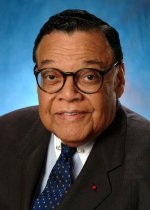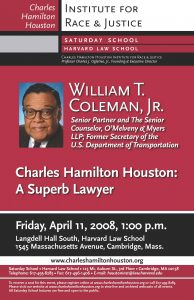
William Thaddeus Coleman, Jr., is a Senior Partner and The Senior Counselor in the national and international law firm of O’Melveny & Myers LLP. Prior to joining the firm, Mr. Coleman served in President Ford’s Cabinet as Secretary of the U.S. Department of Transportation from March of 1975 to January of 1977. There, he was involved in, inter alia, the reorganizations of several major railroads, the substantial completion of the Interstate Highway System, the significant start of the Washington subway system, the U.S. landing rights of the British-French Concorde, as well as the beginning of the deregulation of the trucking industry, the airline industry, and the railroad industry, and the requirement of airbags in automobiles. Following his government service and prior to joining O’Melveny & Myers, Mr. Coleman was a Distinguished Fellow at the Woodrow Wilson International Center for Scholars.
Mr. Coleman has had a life in law, business, public service and family that includes advisory or consultant positions to six former Presidents and the present President.
After graduating summa cum laude in 3 ? years from the College of the University of Pennsylvania in 1941 and magna cum laude and first in his class from the Harvard Law School in 1946 as of the class of 1943 (he started Harvard Law School in September 1941, but was interrupted by almost three years service in the Air Corps of the United States Army). He was a member of the Board of Editors of the Harvard Law Review (Vol. 56, 59 & 60) and recipient of the Joseph E. Beale Prize (which is for excellence and the highest mark in the Conflict-of-Laws Class). He began his law career in May 1947, after being a Fellow at the Law School for 8 months, as law secretary to the late Judge Herbert F. Goodrich of the U.S. Court of Appeals for the Third Circuit. The next year, he served as U.S. Supreme Court law clerk to the late Mr. Justice Felix Frankfurter, the other law clerk being the Honorable Elliot Lee Richardson. In 1949, he joined the New York law firm of Paul, Weiss, Rifkind, Wharton & Garrison as an associate and in 1952, he returned to his native Philadelphia and joined the law firm of Dilworth, Paxson, Kalish, Levy & Coleman where he was serving as a senior partner and head of the Litigation Department at the time of his appointment by President Ford in early 1975 to the President’s Cabinet as Secretary of the U.S. Department of Transportation. In 1993, he received the Harvard Law School Outstanding Alumni Award.
In addition to serving in President Ford’s Cabinet, Mr. Coleman has held several other public service positions which include: member of the U.S. Delegation to the 24th Session of the United Nations General Assembly in 1969; member of the National Commission on Productivity from 1971-1972; member of the Price Commission from 1971-1973; consultant to the U.S. Arms Control and Disarmament Agency from 1963 to 1975; senior consultant and senior counsel to the President’s Commission on the Assassination of President Kennedy in 1964; and a member of President Eisenhower’s Committee on Government Employment Policy (the Branch Rickey Committee) from 1959 through 1961, and member of the Federal Advisory Committee on the Federal Rules of Civil Procedure. (Mr. Dean Acheson was Chairman thereof, the appointment was by the Chief Justice of the United States.) He also served as a member of the Presidential Private Sector Survey on Cost Control in Government, the Presidential Advisory Committee on Federalism, the NASA Advisory Council Task Force on the Effective Utilization of the Shuttle and was Co-Chairman of the Secretary of State’s Advisory Committee on South Africa, 1985-1987, and Advisory Committee Member, the Department of the Treasury: White House Security Review, the Vice President’s Committee on Aviation Safety. After 11 September 2001, he was asked, and did agree, to get involved as a consultant or member on a committee basis, or as a participant, each on a part-time basis, by the Secretary of Defense of the United States in three separate matters: such appointments are (1) advising the Secretary on setting up of the . . . Military Commission to try violators of the Law of War which caused the events of September 11, 2001 and other events thereafter; (2) the Technology and Privacy Advisory Committee which was set up to examine the use of “advanced information technologies, to identify terrorists before they act,” to recommend the development of safeguards “to ensure that the application of technology developed in DOD is carried out in accordance with U.S. law and American values related to privacy;” and (3) to serve as one of four individuals on a review panel for Military Commissions (to discharge this duty, Mr. Coleman will have the rank of a Major General of the U.S. Army).
An ardent defender of civil rights, based, in part, on family tradition, Mr. Coleman was one of the authors of the legal briefs that persuaded the Supreme Court in 1954 to outlaw racial segregation in public schools. In 1965, he was retained by former Governor William Scranton of Pennsylvania to assist in removing racial restrictions at Girard College in Philadelphia. He serves as Senior Director of the NAACP Legal Defense and Educational Fund, Inc., after serving as Chairman of the Board from 1977 to 1997. In April of 1982, after the Executive Branch of the U.S. Government shifted its position so that the Department of Justice could no longer defend the decision of the 4th Circuit that a tax exemption to a charity which discriminated on the basis of race was illegal, Mr. Coleman was appointed amicus curiae by the Supreme Court of the United States to defend the decision of the court below in Bob Jones University v. United States and Goldsboro Christian Schools, Inc. v. United States, which cases were argued before the Supreme Court of the United States, which held by a vote of 8-1 that racially discriminating private charitable schools which denied admission to black students were not entitled to federal tax exemptions.
He has briefed and argued 19 cases in the Supreme Court of the United States. Mr. Coleman is a member of the Pennsylvania and District of Columbia Bars, the Bar of the Supreme Court of the United States and many of the appellate and trial courts of the federal court system.
In December of 1979, the President of France nominated Mr. Coleman as an Officer of the National Order of the Legion of Honor. In September 1995, President Clinton conferred upon him the Presidential Medal of Freedom, the nation’s highest civilian award. In November of 1997, the NAACP Legal Defense and Educational Fund, Inc. presented Mr. Coleman with the Thurgood Marshall Lifetime Achievement Award. In March 2000 the Public Interest Law Center of Philadelphia conferred the Thaddeus Stevens Award, and in April 2000 the Black Leadership Forum, Inc. conferred upon him the Lamplighter Award for leadership. In May 2000 the Council of the American Law Institute conferred upon him the Judge Henry J. Friendly Medal. In October 2000 Mr. Coleman received the Fordham-Stein Prize from the Fordham University School of Law, a prize presented annually to a member of the legal profession whose work exemplifies outstanding standards of professional conduct, promotes the advancement of justice, and brings credit to the profession by emphasizing in the public mind the contributions of lawyers to our society and to our democratic system of government. In March 2004, Mr. Coleman received the Marshall-Wythe Medallion from the College of William & Mary – Marshall-Wythe Law School. In August 2004, he received the Chief Justice John Marshall Award, a national honor created by the American Bar Association Justice Center to recognize individuals responsible for extraordinary improvements in the administration of justice. The American Lawyer Magazine in May 2004 named him as one of the twelve outstanding lawyers in the last twenty five years. In September 2004 Mr. Coleman received the “We The People” award from the National Constitution Center for his lifetime achievements in civil engagement. In June of 2006 he received the Academy of Achievement’s Golden Plate Award. Later that month, he received the District of Columbia Bar Association’s “Legends of the Bar” Award. In February of 2007 he received the American Bar Association’s “Spirit of Excellence” Award; in May he received the University of the District of Columbia Law School’s David A Clarke School of Equal Justice Award, the following week he received the Historical Society of Pennsylvania’s Founder’s Award.
He is the author of “The Supreme Court of the United States: Managing Its Caseload to Achieve Its Constitutional Purposes,” LII Fordham Law Review (1983); “Mr. Justice Felix Frankfurter: Civil Libertarian as a Lawyer and as Justice: Extent to Which Judicial Responsibilities Affected His Pre-Court Convictions,” University of Illinois Law Forum, Volume 1978, No. 2; “The Foreign Corrupt Practices Act of 1977 Regulation of Foreign Business Practices: A Reassessment,” Financial Executive, September 1980; “Corporate Dividends and Conflict of Law,” 63 Harvard Law Review, 1950; “Effect of the Presence of a State Law Question on the Exercise of Federal Jurisdiction,” 5 National Bar Journal, 1947; “Pennsylvania Marital Communities and Common Law Neighbors,” University of Pennsylvania Law Review, Vol. 96, No. 1 (1947) (written with Judge Herbert F. Goodrich, U.S. Court of Appeals for the Third Circuit); “A Tribute to Mr. Justice Thurgood Marshall,” 105 Harvard Law Rev. 42 (1991); “Mr. Justice Thurgood Marshall: A Substantial Architect of the United States Constitution for Our Times,” 101 Yale L.J. 7 (1991); In Tribute: Charles Hamilton Houston, 111 Harv. L. Rev. 2155 (1998); A Friend’s Portrait of Henry W. Sawyer III, 148 U. of Pa. L. Rev.7 (1999); Tribute to Mr. Justice Thurgood Marshall, Vital Issue: The Journal of African American Speeches, Vol. IX, No. 3, p. 4 (1999)
The Honorable Elliott Lee Richardson (of Watergate fame), Bill’s longtime friend and law school classmate, has described Bill Coleman as “an individual of strong loyalties, deep commitment to humane values, and solid practical judgment. Harnessed to a clear and analytical mind and unflagging energy, these qualities make him an effective force in all of the many arenas in which he engages. Add a quick sense of humor and a gift for friendship, and you have in every sense a man for all seasons.”
Press:
William T. Coleman shares stories from his 60-year legal career – Harvard Law News
